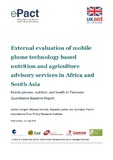| dc.contributor.author | Gilligan, Daniel | |
| dc.contributor.author | Hidrobo, Melissa | |
| dc.contributor.author | Ledlie, Natasha | |
| dc.contributor.author | Palloni, Giordano | |
| dc.coverage.spatial | Tanzania | en |
| dc.date.accessioned | 2018-07-26T11:40:11Z | |
| dc.date.available | 2018-07-26T11:40:11Z | |
| dc.date.issued | 2018-07-12 | |
| dc.identifier.citation | Gilligan, D.; Hidrobo, M.; Ledlie, N. and Palloni, G. (2018) Mobile Phones, Nutrition,and Health in Tanzania: Quantitative Baseline Report, Brighton: IDS | en |
| dc.identifier.uri | https://opendocs.ids.ac.uk/opendocs/handle/20.500.12413/13935 | |
| dc.description.abstract | This report focuses on the quantitative component which employs a cluster randomised controlled trial to identify the causal effect of the programme on nutrition knowledge, Infant and Young Child Feeding (IYCF) practices, women’s dietary diversity, and the nutritional status of young children.
The quantitative evaluation will answer the following research questions:
1. What is the impact of the mNutrition programme on women’s dietary diversity?
2. What is the impact of the mNutrition programme on Infant and Young Child Feeding (IYCF) practices?
3. What is the impact of the mNutrition programme on nutritional status for children under twelve months of age at baseline?
4. What is the impact of the mNutrition programme on nutrition knowledge, including knowledge of IYCF practices, among pregnant women and the caregivers of young children?
5. Does sending the mNutrition programme to the mobile phones of both the primary female—either the pregnant woman or the mother of the child under twelve months of age at baseline—and the primary male—typically the spouse of the primary female—have a differential impact on the other primary and secondary outcomes?
This baseline report introduces the evaluation context, describes the mNutrition intervention in Tanzania, details the evaluation design plans, summarizes the data obtained through the baseline household survey, and tests whether the randomizations successfully balanced baseline observable characteristics across the different treatment arms. The findings from this quantitative baseline report will be integrated with those from the baseline qualitative report and the baseline business model and cost-effectiveness reports to produce a mixed methods baseline report that reflects the full mNutrition impact evaluation in Tanzania. | en |
| dc.language.iso | en_US | en |
| dc.publisher | Institute of Development Studies | en |
| dc.rights.uri | http://creativecommons.org/licenses/by-nc-nd/4.0/ | en |
| dc.subject | Agriculture | en |
| dc.subject | Nutrition | en |
| dc.subject | Technology | en |
| dc.title | Mobile Phones, Nutrition,and Health in Tanzania: Quantitative Baseline Report | en |
| dc.type | Other | en |
| dc.rights.holder | Institute of Development Studies | en |
| dc.identifier.team | Health and Nutrition | en |
| rioxxterms.funder | Department for International Development | en |
| rioxxterms.identifier.project | External evaluation of mobile phone technology based nutrition and agriculture advisory services in Africa and South Asia (mNutrition) | en |
| rioxxterms.version | VoR | en |
| rioxxterms.funder.project | 417282f8-10a9-42e1-9fb8-98ed18297269 | en |


